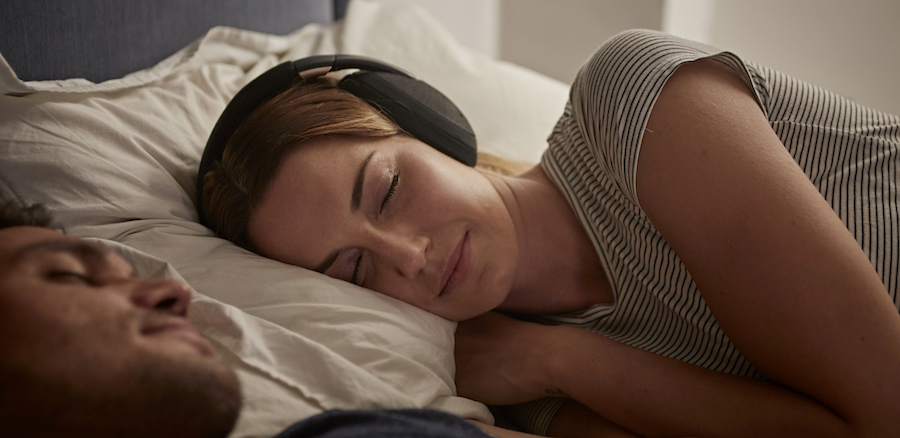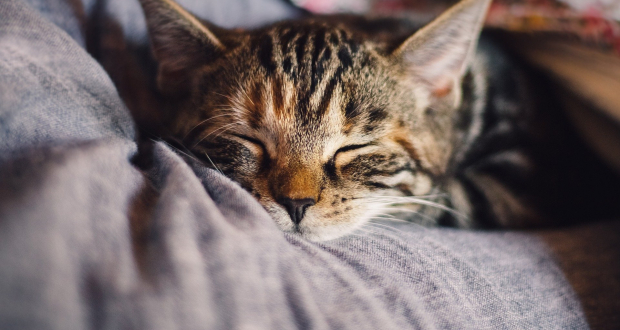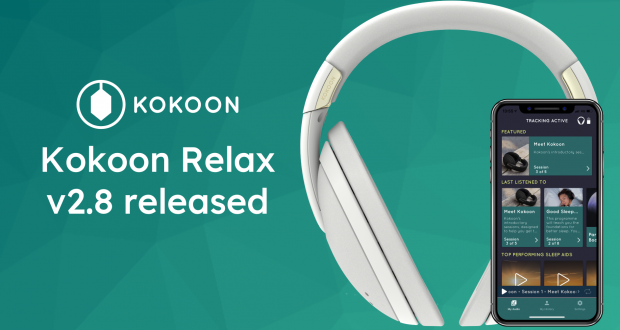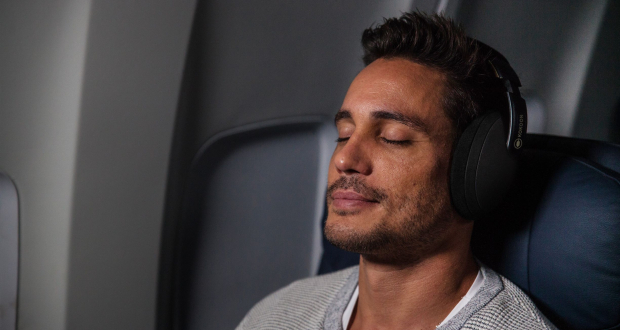And while the odd sleepless night might not lead to anything more serious than an unproductive day, longer periods can lead to depression, a weakened immune system, and even stroke and obesity. The good news is: there are many resources out there specifically designed to help you fall asleep and get the rest you need.
But where to begin? A great place to start is audio. After all, we’ve been using sounds to get children and babies to sleep since… we had children and babies! And as adults, we’re still highly sensitive to noises when we sleep (it’s our inbuilt alarm system that wakes us up when we hear loud noises), so just as some sounds can keep us awake, more on those in a bit, others can help us fall asleep. Here’s our guide to what’s what.
THE GOOD SOUNDS
White noise
White noise sounds a bit like the static noise a TV makes when it’s not tuned in. Some people play it because they prefer its sound to silence, but it’s usually used to mask disruptive sounds – such as dogs barking or road traffic. And while it might seem strange to add more noise to a noisy environment, white noise actually masks sporadic sounds in a way that makes them blend into the background – so your brain doesn’t notice them as much, giving you a better chance of switching off and drifting to sleep. Because white noise works by acting like a sound barrier, it’s important you keep the white noise on while you’re sleeping, to prevent you from being woken up by external noises.
Pink noise
Pink noise is the name given to a frequency spectrum that mixes low and high frequencies to create a more balanced, flat sound than white noise. In one sleep experiment (1), experts have found that playing pink noise to people while they’re already asleep encourages them to stay in deep sleep, which has benefits for memory too. Various sleeping apps will play pink noise to sleepers at optimum stages of the sleep cycle to help prolong deep sleep.
Soundscapes
If the thought of listening to static or flat sounding frequencies doesn’t appeal, there are plenty of nature-inspired alternatives to choose from instead. Repetitive, low frequency and natural soundscapes such as crickets, rainfall, crashing waves and even whale song, can provide soothing background noises that aid sleep.
ASMR
Imagine a soft, gentle voice telling you nice things about the world in a pleasant tone that’s low, slow and relaxed. Feeling tingly and relaxed yet? ASMR stands for autonomous sensory meridian response, which is the name given to a tingling sensation brought on by watching and/or listening to someone do a soothing repetitive motion, such as brushing hair, folding towels or whispering pleasant thoughts. For people who experience ASMR (it doesn’t work for everyone) this tingling, relaxing sensation can induce sleepiness. From listening to slime pulled over a microphone to watching Chinese herbal shop roleplays, lots of things can trigger ASMR and, hopefully, send you to sleep.
CBT-based exercises
Not being able to sleep, knowing you need to fall sleep, and then feeling increasingly anxious when you can’t, and therefore becoming even less likely to sleep, is a familiar pattern for many. For some people, the vicious circle is so ingrained that the very act of going to bed is associated with anxiety – making it a losing battle from the beginning. Cognitive Behavioural Therapy (CBT) based exercises such as mindful breathing and body scans can help to refocus the mind and break the negative thought cycles that prevent a person from falling asleep. Body scanning is a technique that involves bringing awareness to different parts of the body by focussing on physical sensations. It can help calm the mind and turn down inner monologues, helping to break the cycles in the process. The Kokoon Relax app has a library of CBT-based sleep exercises, including guided breathing and body scanning, designed to guide you to sleep.[/vc_column_text][/vc_column][/vc_row][vc_row][vc_column][vc_empty_space height=”45px”][vc_single_image image=”47496″ img_size=”full” onclick=”custom_link” link=”http://get.kokoon.io/fast-sleep-toolkit/”][vc_empty_space height=”45px”][vc_column_text]
THE BAD SOUNDS
Road traffic
It might seem obvious, but this common cause of environmental noise could be having a much worse effect on your sleep than you realise. Studies show (2) that sounds as low as 30 decibels (which equates to a person whispering nearby) can affect rest and busy traffic can be as loud as 70 decibels. Add to the mix an ambulance siren (120 decibels) and a car horn (110 decibels) and you have a serious noise problem on your hands. It’s so bad, the World Health Organisation estimates that “at least one million healthy life years are lost every year from traffic related noise in the western part of Europe.” And the main culprit is roads: “Sleep disturbance and annoyance, mostly related to road traffic noise, comprise the main burden of environmental noise,” says the report.
Noisy neighbours
Ever found yourself staring incredulously at your bedroom wall wondering how anyone can be so LOUD?! You’re not alone. According to one study (3) by Churchill Home Insurance, noisy neighbours keep a quarter of British adults awake, costing people in the UK an average of 6.5 hours sleep per week – that’s nearly a full night’s sleep! Topping the list of noises keeping them awake are bass music, couples arguing, drilling and babies crying.
Conclusion
It is no surprise audio is being used by so many sleep experts to help people sleep; numerous studies have demonstrated how efficient it can be.
Today’s sleep aiding apps are bringing sleep aiding audio programs to the bedroom, and when intelligently combined with sleep sensing technology, these solutions can be very effective at helping people with sleep problems.
It is important to note that the wrong type of audio can also disrupt sleep, so it is important to also ensure you can sleep in the right conditions.
Links and sources
- Rain Sounds 10 Hours: The Sound of Rain Meditation, Autogenc Training, Deep Sleep, Relaxing Sounds
- * WTO: Burden of disease from environmental noise
- Sleep and Relaxation Nature Sounds, Crickets Summer Night – Sleep Music
- Gentle Whispering ASMR – Top Triggers 2018
- 10 Hours of White Noise
- Pink Noise Ten Hours – Dark Screen
- 1- https://www.ncbi.nlm.nih.gov/pubmed/28337134
- 2- http://www.euro.who.int/__data/assets/pdf_file/0008/136466/e94888.pdf
- 3- https://www.dailymail.co.uk/property/article-5865181/Churchill-Home-Insurance-reveals-live-block-flats-noisy-neighbours.html













